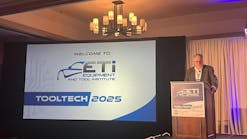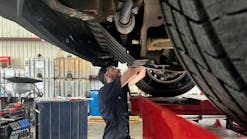CVSA releases 2017 International Roadcheck results
Commercial motor vehicle enforcement personnel in Canada and the United States conducted more than 62,000 driver and vehicle safety inspections on large trucks and buses during the Commercial Vehicle Safety Alliance’s (CVSA) 30th annual International Roadcheck, June 6-8, 2017. Twenty-three percent of vehicles and 4.2 percent of drivers that received Level I Inspections were placed out of service.
International Roadcheck is a three-day enforcement event when CVSA-certified inspectors conduct high-volume, large-scale, high-visibility roadside inspections of large trucks and buses. Commercial motor vehicles and their drivers were checked at inspection sites, weigh stations and roving patrol locations along roadways in North America throughout the 72-hour enforcement initiative.
- A total of 62,013 Level I, II and III Inspections were conducted during 2017 International Roadcheck.
- 19.4 percent of commercial motor vehicles inspected (Level I, II or III Inspections) were placed out of service. 4.7 percent of all drivers inspected (Level I, II, and III Inspections) were placed out of service.
- 40,944 inspections were North American Standard (NAS) Level I Inspections. A Level I Inspection is a 37-step procedure that includes examination of both the driver and vehicle. Other inspections conducted included the NAS Level II Walk-Around Inspection (12,787) and the NAS Level III Driver-Only Inspection (8,282).
- 7,713 inspections were conducted in Canada; 54,300 were conducted in the United States.
Vehicle-related results are as follows:
- Of the 40,944 Level I Inspections conducted, 23 percent (9,398) percent were placed out of service for vehicle-related violations.
- The top three out-of-service vehicle violations were for brake systems (26.9 percent of vehicle out-of-service violations), cargo securement (15.7 percent) and tires/wheels (15.1 percent).
- Of the 2,267 vehicles carrying hazardous materials/dangerous goods that received a Level I Inspection, 12.8 percent were placed out of service for vehicle-related violations.
- The top three vehicle violations related to the transportation of hazardous materials/dangerous goods were for loading and securement (40.4 percent of all out-of-service hazardous materials/dangerous goods violations), shipping papers (22.7 percent) and placarding (20.8 percent).
- 398 motorcoaches received Level I Inspections; 10.1 percent (40) were placed out of service for vehicle-related violations.
- Of the vehicles placed out of service, brake adjustment and brake system violations combined to represent 41.4 percent (7,743) of all out-of-service vehicle violations.
Driver results are as follows:
- Of the 62,013 total Level I, II, and III Inspections conducted, 4.7 percent (2,940) of drivers were placed out of service for driver-related violations.
- Of Level I, II and III Inspections of vehicles carrying hazardous materials/dangerous goods, 1.9 percent were placed out of service for driver-related violations.
- Out of the 598 motorcoaches that received Level I, II or III Inspections, 3.8 percent (23) of drivers were placed out of service for driver-related violations.
- The top three driver-related violations were for hours of service (32.3 percent of driver out-of-service violations), wrong class license (14.9 percent) and false log book (11.3 percent).
- There were 710 safety belt violations.
Each year, International Roadcheck places special emphasis on a category of violations. This year’s focus was cargo securement. While checking for compliance with safe cargo securement regulations is always part of roadside inspections, CVSA highlighted proper cargo securement this year as a reminder of its importance. Cargo securement violations (not including hazardous materials/dangerous goods loading/securement) represented 15.7 percent of all vehicle out of service violations during 2017 International Roadcheck.
The top five violations related to cargo securement (out of a total of 3,282) in the United States were:
- No or improper load securement (423)
- Failure to secure vehicle equipment (379)
- Leaking, spilling, blowing, falling cargo (281)
- Insufficient tiedowns to prevent forward movement for load not blocked by headerboard, bulkhead or cargo (256)
- Failure to secure load (178)
Once violations of the regulations have been identified and documented on a roadside inspection report, roadside enforcement personnel use the CVSA NAS Out-of-Service Criteria as the pass-fail criteria for inspections. During an inspection, if an inspector identifies critical violations, he or she will render the driver or vehicle out of service, which means the driver cannot operate the vehicle until the critical vehicle mechanical conditions or defects, and/or driver qualifications, are corrected.
If no critical violations are found during an eligible inspection, a CVSA decal will be applied as a visual indicator that the vehicle successfully passed inspection conducted by a CVSA-certified inspector. The NAS Level I Inspection and NAS Level V Vehicle-Only Inspections are the only inspections eligible for issuance of a CVSA decal.
“This year, we’re celebrating 30 years of the International Roadcheck Program,” said CVSA President Julius Debuschewitz with Yukon Highways and Public Works. “When this program started in 1988, the goal of International Roadcheck was to conduct inspections to identify and remove unsafe commercial motor vehicles and/or drivers from our roadways. Thirty years and 1.5 million inspections later, the International Roadcheck enforcement initiative is still going strong, thanks to the more than 13,000 inspectors who work hard every day to reduce the number of crashes, injuries and fatalities on our roadways.”
During International Roadcheck, inspectors primarily conduct the NAS Level I Inspection, which is a 37-step procedure that includes examinations of both the driver and vehicle. The vehicle inspection includes checking braking systems, cargo securement, coupling devices, driveline/driveshaft components, exhaust systems, frames, fuel systems, lighting devices, steering mechanisms, suspensions, tires, van and open-top trailer bodies, wheels, rims and hubs, and windshield wipers. Additional items for buses include emergency exits, electrical cables and systems in the engine and battery compartments, and seating. Drivers are asked to provide their operating credentials and hours-of-service documentation, and will be checked for seat belt usage. Inspectors will also be attentive to apparent alcohol and/or drug impairment.
International Roadcheck is the largest targeted enforcement program on commercial motor vehicles in the world, with more than 13 trucks or buses inspected, on average, every minute throughout North America during a 72-hour period. It is sponsored by CVSA, North America’s leading commercial motor vehicle safety enforcement organization, with participation by the Federal Motor Carrier Safety Administration, the Canadian Council of Motor Transport Administrators and the Secretariat of Communications and Transportation in Mexico.


